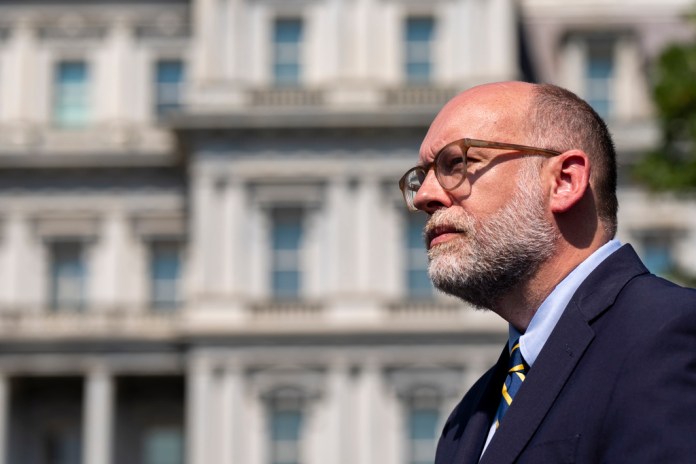Senate Democrats stood their ground on Wednesday opposing a GOP government funding plan, even as the Trump administration used the first day of a shutdown to begin slashing federal projects already funded in blue states.
White House budget director Russ Vought canceled or postponed roughly $26 billion for clean energy and transportation projects in more than a dozen Democratic-led states, drawing criticism that signals how the apparent pressure campaign isn’t, at least so far, softening congressional resistance in a fight over healthcare.
“I know how to stand up to a bully. You don’t back down,” said Sen. Chris Murphy (D-CT), a junior member of the Democratic leadership team. “What he did today is likely completely illegal. It’s a threat to our democracy if a president can just spend money in Republican states and not in Democratic states.”
Sen. Brian Schatz (D-HI), slated to become the second-ranking Senate Democrat next Congress, laughed at the notion that Vought’s actions could move them off their demands to extend Obamacare subsidies that are set to expire at the end of the year.
“Allocations to states, as a matter of law, cannot be made on the basis of partisan affiliations,” said Schatz, who was among 10 Democrats to side with Republicans in March and avert a shutdown. “Were they a little more careful, they would have sprinkled in a Republican state or two. I do not think this will hold up in court.”
According to Vought, the funds already appropriated by Congress that were at risk included $18 billion put “on hold” in New York for the Hudson Tunnel Project and Manhattan’s Second Avenue Subway development over concerns they’re tied to “unconstitutional” diversity, equity, and inclusion initiatives. Another almost $8 billion for “Green New Scam” projects in 16 states, all led by Democrats, would be “cancelled,” he said.
Vice President JD Vance framed the administration’s actions as a natural consequence of a shutdown, rejecting the notion that they were attempting to squeeze House Minority Leader Hakeem Jeffries (D-NY) and Senate Minority Leader Chuck Schumer (D-NY) to relent on their healthcare demands.
“I’m sure that Russ is heartbroken about the fact that he is unable to give certain things to certain constituencies. We want to do everything that we can to help the American people,” Vance said. “But when the Democrats shut down the government, we have to actually do a little triage to make sure the most critical and most essential services are provided.”
Despite Democrats constituting the loudest complaints, some Republicans voiced concerns that the White House’s actions were either an overstep in executive authority or inviting unnecessary political blowback at a time when Republicans presumably have the upper hand.
The White House also previewed “imminent” mass federal layoffs that may be permanent rather than temporary furloughs. Vought privately told House Republicans on a call Wednesday that the reduction in force would occur this week, according to a source familiar with the matter. A GOP lawmaker told the Washington Examiner that Vought warned programs such as the Women, Infants, and Children nutrition program may pause without additional funding.

“We can’t just react to the intimidation,” Sen. Peter Welch (D-VT) said. “Trump has made it clear that whatever appropriation is passed on a bipartisan basis, he’ll rip up.”
Schumer kept his caucus mostly in lockstep on Wednesday to defeat the third and latest vote to fund the government with a “clean,” seven-week measure from Republicans designed to give appropriators more time to craft a yearlong budget and a possible Obamacare subsidy extension. The bill passed the GOP-controlled House last month.
But while Democratic leadership dug in against what they are calling the administration’s “intimidation tactics,” cracks began to show among the rank-and-file.
Two Democrats and one independent supported the Republican funding bill on Wednesday, meaning five more are needed to break the Senate filibuster’s 60-vote threshold. A large, bipartisan group of senators also huddled on the floor during the vote to “spitball” avenues out of the shutdown. Those conversations were preliminary and have not risen to the leadership level, according to Sen. Ruben Gallego (D-AZ), beyond Senate Minority Whip Dick Durbin (D-IL) listening in on the discussion.
SCHUMER COALITION HOLDS STEADY AS DEMOCRATS OPPOSE THIRD GOP FUNDING VOTE
“I was throwing out some ideas that will give them room and give us room, and we all agree that we’ll continue talking,” Gallego later told the Washington Examiner. “No agreements were made.”
The Senate left Wednesday afternoon and will not return again for votes until Friday due to the Jewish holiday Yom Kippur, ensuring the shutdown will persist into later in the week.
Rachel Schilke and Christian Datoc contributed to this report.
